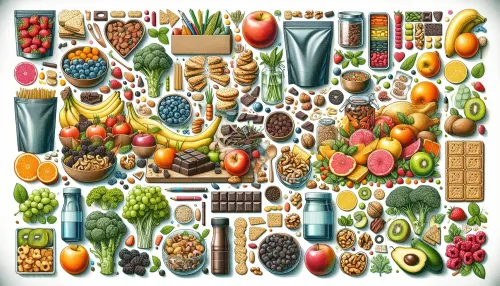Balanced Eating Unveiled: What I Wish I Knew About Nutrition Fundamentals

When it comes to understanding nutrition fundamentals, a key concept that resonates with many individuals is the composition of macronutrients and micronutrients. Macronutrients, consisting of carbohydrates, proteins, and fats, are the primary sources of energy for the body. On the other hand, micronutrients such as vitamins and minerals play crucial roles in various bodily functions. Achieving a balanced diet involves incorporating these building blocks in appropriate proportions to support overall health and well-being.
Understanding Macronutrients and Micronutrients
While calorie counting is a commonly discussed approach to weight management, emphasizing the quality of one's diet over sheer quantity is gaining traction. This shift in focus underscores the importance of consuming nutrient-dense foods that offer a plethora of vitamins, minerals, and antioxidants. Understanding the quality versus quantity debate empowers individuals to make informed choices that prioritize nourishment and long-term health benefits.
Quality vs. Quantity: Rethinking Calorie Counting
The term "superfoods" has permeated the health and wellness industry, often accompanied by lofty claims about their extraordinary health benefits. However, it's essential to approach this concept with caution and discernment. While certain foods indeed boast exceptional nutritional value, labeling them as "superfoods" may create unrealistic expectations. A balanced diet incorporates a variety of nutrient-rich foods rather than solely relying on hyped-up "superfoods."
Amid discussions about food, the significance of proper hydration can sometimes be overlooked. Drinking an adequate amount of water is imperative for maintaining optimal bodily functions. Proper hydration not only supports digestion and nutrient absorption but also contributes to cognitive function, physical performance, and overall vitality.
Related Article: Forgotten Figures in Nutritional Wellness: Reviving Legacies of Nutrient Pioneers for Modern Diets
The Truth About Superfoods: What You Need to Know
Intuitive eating emphasizes a mindful, attuned approach to consumption by honoring the body's hunger and fullness cues. By fostering a healthy relationship with food and rejecting restrictive dieting practices, individuals can cultivate a sustainable and balanced approach to eating that aligns with their body's unique needs.
The Importance of Hydration for Health
Recognizing and addressing food allergies and sensitivities is paramount in designing a personalized, health-supportive diet. By identifying trigger foods that may induce adverse reactions, individuals can proactively tailor their dietary choices to mitigate discomfort and optimize overall well-being.
Related Article: Holistic Hydration: Beyond the Water Bottle for Optimal Health
Intuitive Eating: Listening to Your Body's Needs
Efficient meal planning serves as a cornerstone for adhering to a balanced diet amidst life's demands. By strategizing weekly meals, individuals can streamline grocery shopping, minimize food waste, and ensure consistent access to nutritious options that align with their dietary goals.
Uncovering hidden sources of added sugars and processed ingredients within one's diet is pivotal for promoting nutritional discernment. Through heightened awareness of food labels and ingredient lists, individuals can make conscientious choices that mitigate excessive sugar intake and reduce reliance on heavily processed foods.
Managing Food Allergies and Sensitivities
As a growing number of individuals explore plant-based dietary approaches, integrating more greens into meals has gained prominence. Embracing plant-based basics involves incorporating an array of vegetables, legumes, whole grains, nuts, and seeds. This endeavor not only enriches one's diet with diverse nutrients but also contributes to environmental sustainability.
A Beginner's Guide to Meal Planning
Incorporating these fundamental principles into your daily eating habits can pave the way for tangible improvements in your overall health and well-being. At Peppino Blog, we are committed to providing valuable insights that empower you to make informed choices for a balanced lifestyle.
Frequently Asked Questions
Macronutrients include carbohydrates, proteins, and fats, serving as the primary energy sources for the body. Micronutrients, such as vitamins and minerals, are essential for various bodily functions. A balanced diet requires an appropriate proportion of both to support overall health and well-being.
To uncover hidden sugars, it’s crucial to read food labels and ingredient lists carefully. Look for terms like high fructose corn syrup or any ingredient ending in "-ose." Being aware of these hidden sources helps you make informed choices and reduce excessive sugar intake.
Incorporating more greens can be achieved by adding a variety of vegetables, legumes, and whole grains to your meals. Consider including salads, smoothies, or stir-fries that feature leafy greens. This not only enhances nutrient intake but also supports environmental sustainability through plant-based eating.
Check Out These Related Articles

Mindful Nutrition: The Art of Eating Well for Holistic Health

Snack Smart: Wholesome Bites for Energy and Vitality

Unraveling the Superfood Saga: Nutritional Superheroes or Overhyped Eats?
